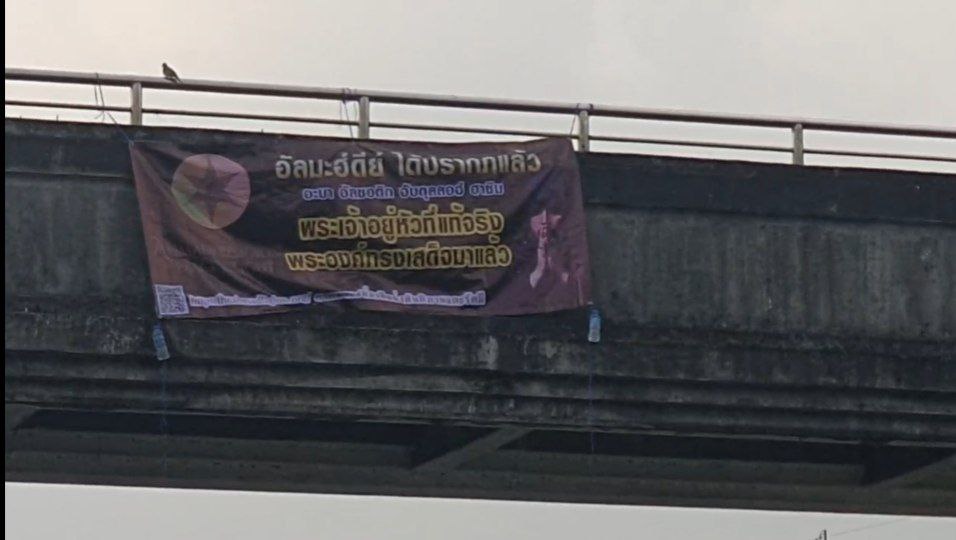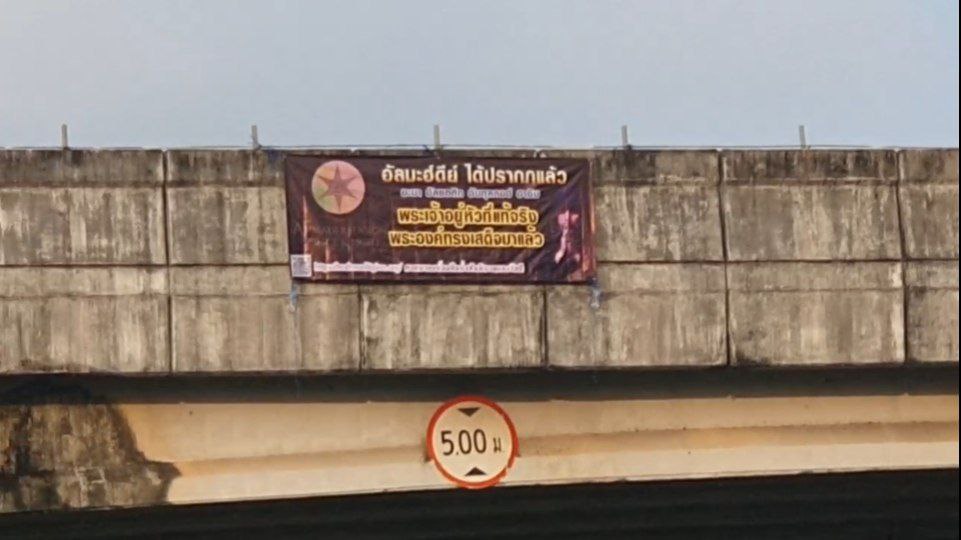Banners for the Mahdi: A Thai Believer's Stand
- James Pollard
- 1 day ago
- 4 min read
BANGKOK — Banners bearing religious slogans and imagery unfamiliar to most Thais have been appearing across the country—hung from bridges, pinned to walls, and circulated online. Their sudden emergence has stirred concern within national security circles, triggering investigations by Thai authorities seeking to trace their origin.
We spoke with one of the courageous men involved—Chanon Kheansuwan. In the so-called Land of Smiles, Chanon, a member of the AROPL faith, is fearlessly challenging the gilded facade of Thailand’s monarchy. In a nation where the king—worth an estimated $43 billion, more than the GDP of some countries—receives godlike adoration, Chanon is one of few openly calling out the cruelty, elitism, and repression of a ruler propped up by megalomania and myth.
“Ibn Abdul Barr said, ‘It is said that the worst rulers are far from the scholars and the worst scholars are near to the rulers,’” - Jāmi’ Bayān al-‘Ilm 727.
Chanon is undeterred, exposing what he describes as the false king’s tyranny. "Only God has the right to choose the king of the earth," he says. For him, that king is Aba Al-Sadiq.
In a country where a comment as mild as “the king is not doing a great job” can result in up to 15 years in prison, Chanon’s outspoken stance is risky. One man was jailed in 2017 for 35 years over Facebook posts critical of the monarchy. Meanwhile, the monarch celebrates lavishly—spending $12 million on his Golden Jubilee and maintaining 13 luxury residences—while much of his nation lives in poverty.
We spoke to Chanon about his journey, his beliefs, and his unwavering resolve.
What is your culture and religious background?
I was born into a Sunni Muslim family. I work in agriculture, which provides me with a sustainable living. I wasn’t well-versed in religion earlier in life—I was more focused on the injustice and corruption I saw in society. But as I matured and started a family, I began seeking deeper knowledge.
What made you doubt the path you were on?
As I grew older, I began questioning what true Islam actually looked like. I couldn’t understand why Imam Ali Ibn Abi Taleb wasn’t the first Caliph, even though it was clear he had the most merit. That led me to revisit the Prophet’s own words. The Prophet Mohammed had declared, “Ali is the master of all the believers after me” (Sahih Muslim, vol. 2 p. 362), “I am the city of knowledge, and Ali is its gate” (Tirmidhi, vol. 5 p. 201), and “Loving Ali is believing, and hating him is hypocrisy” (Muslim, vol. 1 p. 61). These statements made me reconsider everything I thought I knew.
What kept you open-minded enough to explore other views?
I chose not to limit myself to any single sect. I listened to voices from all schools of thought, always looking for the truth rather than just confirming what I already believed.
What tribulations did you face during your search for truth?
My family strongly opposed me. They said I had gone astray. My wife even left me at one point but later returned, initially saying she wanted to pledge allegiance too—but she eventually changed her mind again.
What ultimately convinced you of the call of AROPL?
The Prophet said Islam would split into 73 sects and only one would be correct—the one that follows his tradition and rulings. I began to wonder if I was truly on that correct path. Before COVID-19, I came across the white banners of the Yamani through a brother named Ayyub. I remained in the background for some time, continuing my research, often aligning with Iranian schools of thought, but they didn’t give me certainty. Eventually, I found a Thai believer's livestreams and then lectures by Imam Aba Al-Sadiq. Those lectures cleared my doubts completely. That’s when I asked for the recitation of the pledge of allegiance.
Have you had any dreams, visions, or signs that confirmed your path?
Yes. I once had a dream I didn’t understand, but I kept it in my heart. I used to think about migrating to a country with justice and peace, free from corruption and drug abuse. When I found this religion, it felt like everything I had longed for—it matched both the inner vision and the outer mission of the Mahdi Utopia.
What have you done since joining the AROPL faith?
I’ve been campaigning for the Divine Just State, mainly through social media. It’s easier and less restricted that way. My goal is for the Ahmadi Religion of Peace and Light to establish its own state.
What motivates you to share posters and placards of the Mahdi?
The undeniable truth that Imam Aba Al-Sadiq is the representative of God on Earth. He holds divine authority, and his appointment is sealed by the Prophet Muhammad himself.
How do local Islamic leaders and authorities react to your efforts?
Religious leaders accuse us of being disbelievers without even listening to us. Meanwhile, the government closely monitors our movements. National security is involved.
How risky is it to spread this call in Thailand?
t’s extremely risky. Article 112 of the constitution criminalizes insulting the monarchy, with punishments from 3 to 15 years per offense. In practice, sentences can be stacked. Some people have even disappeared under mysterious circumstances.














Faith True faith and love The true faith and love that everyone has for God. The true faith and love that everyone has for God, the true God of all mankind has come down. The true faith and love that everyone has for God, the true God of all mankind has come down.
God bless this pure brother who is spreading the call of the Qaim (pifh) at great risks. He is truly inspirational to us who can freely spread the message. This was an amazing article. Thank you.
ขอให้อัลลอฮ์ทรงตอบแทนพี่น้องของ้เราชานนท์ ต่อความทุ่มเทและการเสียสละของเขาในศาสนานี้ นี้เป็นการงานหนึ่งที่ดีเลิศ อัลฮัมดุลิลละห์